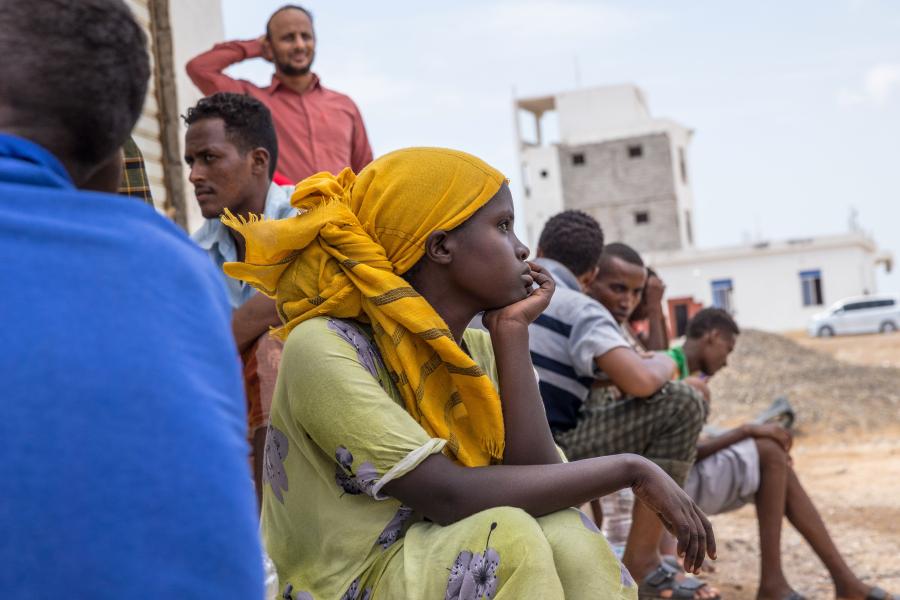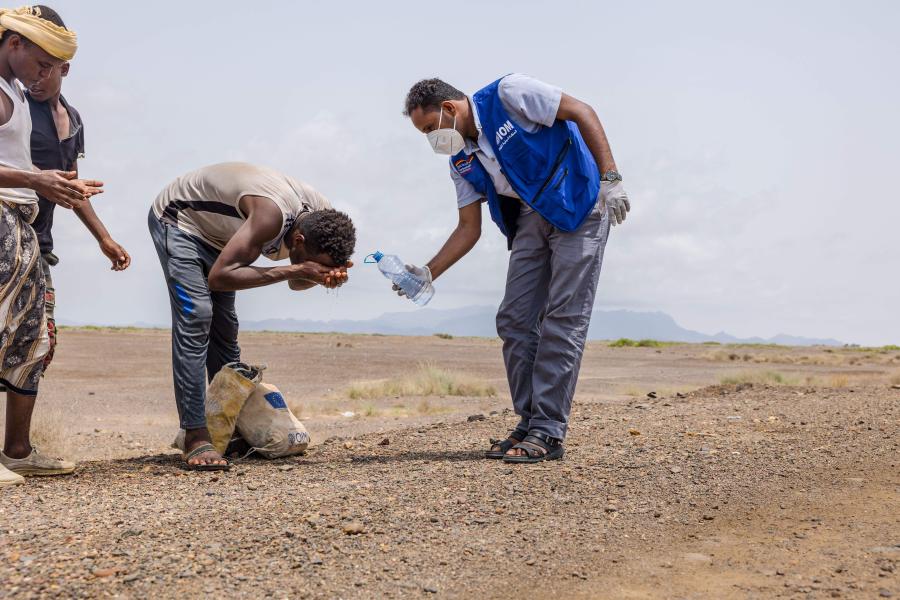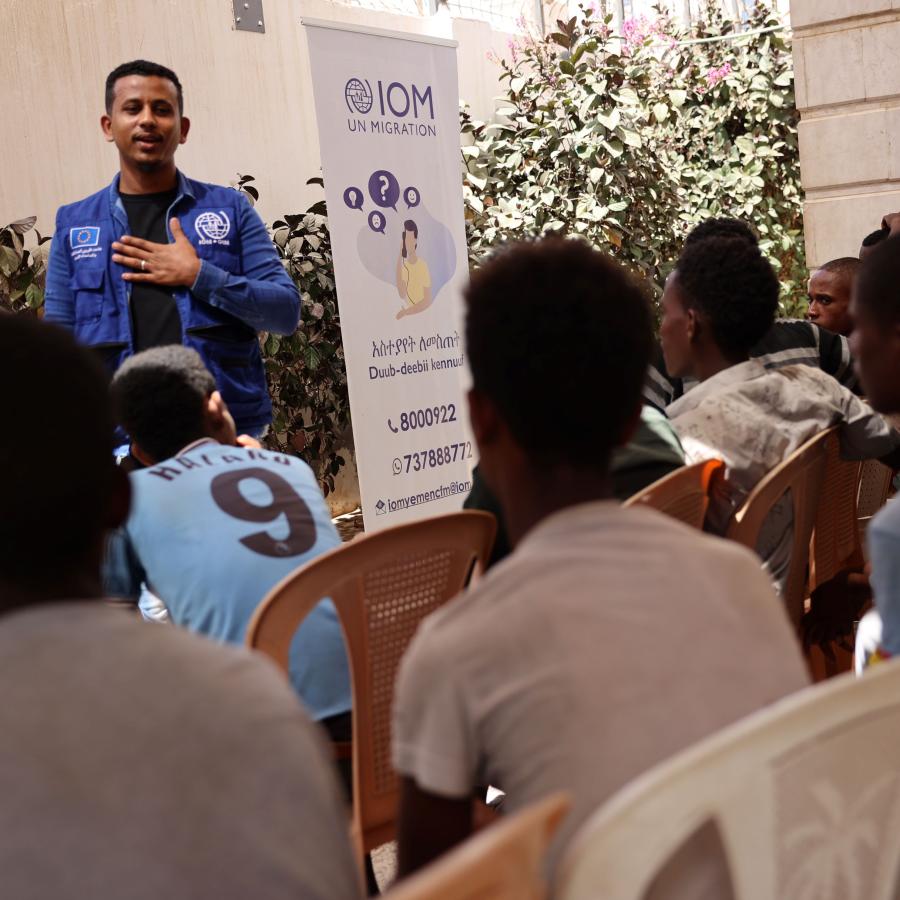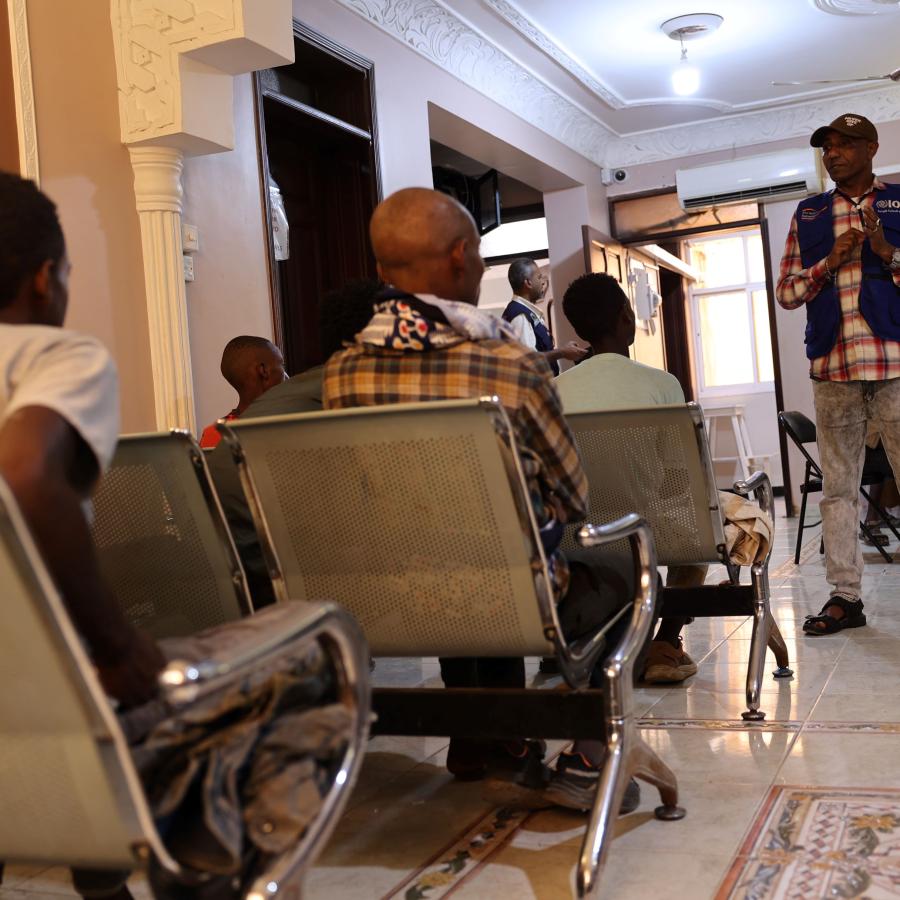IOM Yemen - THE LONG ROAD HOME - How a Migrant’s Grit Led to Newfound Freedom
Aden, Yemen
When Lidia* made the decision to leave Ethiopia, she never imagined that her quest for a better life would become a harrowing ordeal. At just 17 years old, filled with ambition and curiosity, she eagerly set out to explore the world and seize whatever opportunities life had in store for her.
Lured by smugglers promising a smooth journey to the Gulf countries, Lidia took a gamble on this perilous route through Yemen. Little did she realize, she was embarking on one of the most treacherous journeys of her life, leaving behind her home, family, and safety.

LIDIA’S GAMBLE
Lidia’s journey started aboard one of the smugglers’ boats, enduring days and nights at sea, a challenge she believed at the time to be the toughest part of her adventure. Upon reaching the shores of Aden, she found herself thrust into weeks of relentless walking alongside her fellow travelers, with little time to rest and barely anything to eat.
In a foreign land where she couldn’t speak the language or understand her whereabouts, Lidia had no choice but to follow one smuggler after another until she could reach her final destination. However, migrants relying on smugglers to reach the Gulf countries often face a perilous journey marked by sexual harassment, torture, abduction, and extortion.
As she approached the border separating Yemen from the Kingdom of Saudi Arabia, Lidia clung to hope that her hard work would bear fruit and that she would soon reach the Gulf countries. Yet, the reality that awaited her was far more horrifying than she could have ever imagined.
Lidia could never erase the haunting image of hundreds of migrants scattered along Yemen's border, enduring dire living conditions.
“The situation of migrants was beyond what I had heard before; men, boys, and especially women were severely exploited by traffickers and smugglers,” she recounts.

UNFORESEEN ORDEAL
Despite Yemen’s decade-long conflict, it remains a crucial transit point for migrants from the Horn of Africa. In 2023 alone, over 97,000 migrants arrived in Yemen, facing multiple challenges, including stigma, discrimination, and gender-based violence.
Amidst the barren borders devoid of basic services and with inadequate shelters, Lidia and her fellow migrants had to work for long exhausting hours to pay off smugglers. Months of strenuous labor and poor nutrition took a toll on Lidia’s health, leaving her in urgent need of medical attention. However, restricted movement, financial constraints, and lack of proper documentation deprived her of access to healthcare facilities.
With no means to sustain herself, Lidia found herself trapped in the clutches of smugglers who coerced her into labor to repay her supposed debt. Desperate, Lidia reached out to her family for ransom money – an amount they couldn’t afford at the time. After months of anguish, Lidia’s family scraped together enough funds to secure her release.


VITAL MIGRANT SERVICES
In response to the urgent needs of migrants, the International Organization for Migration (IOM) adopts a comprehensive approach to protection and healthcare in Yemen, ensuring migrants have access to vital services, including mental health and psychosocial support.
Lidia arrived at the Migrant Response Point (MRP) in Aden in dire condition, barely able to walk due to her swollen feet. With assistance from IOM doctors, she received the necessary healthcare and began her journey to recovery.
At the Migrant Response Point (MRP), vulnerable migrants may also receive cash assistance to address their essential needs. Following thorough consultation and needs assessment, some may be referred to the Community-Based Care (CBC) for tailored protection services.
“The Migration Response Point provides a sense of safety and dignity for migrants,” explains Eman, a case worker at the MRP, who assists migrants in obtaining essential documents for their return.
She highlights the complexities faced by stranded migrants, who often arrive at the center without any documentation.
SAFE PASSAGE HOME
With an estimated 43,000 stranded migrants in Yemen wishing to return home, IOM’s Voluntary Humanitarian Return (VHR) programme remains their safest option. IOM expects at least 15,000 migrants to be in need of VHR support in 2024.
Under the VHR programme, IOM coordinates flights, offers counseling and medical screenings prior to departure, assists with procuring travel documents, and collaborates with authorities to ensure safe transit. In the first two months of 2024, nearly 1,600 Ethiopian migrants had already returned through IOM’s VHR flights from Yemen to Ethiopia.
“For me, nothing compares to the feeling of security,” explains Lidia. “Finally, I have found a safe way to return home to my family.”
*Name has been changed to protect identity
IOM’s humanitarian assistance and protection services in response to the needs of returnees are aligned with the Regional Migrant Response Plan for the Horn of Africa and Yemen 2024, which aims to address the needs of migrants in vulnerable situations and host communities in countries situated along the Eastern Migration Route, located between the Horn of Africa and Yemen.
FOOTNOTES
IOM’s protection assistance through the MRPs and CBCs is funded by EU Humanitarian Aid, the United States Bureau of Population, Refugees and Migration (PRM) and the Norwegian Ministry of Foreign Affairs. IOM’s VHR programme is funded by PRM and the Ministry of Interior of France.

